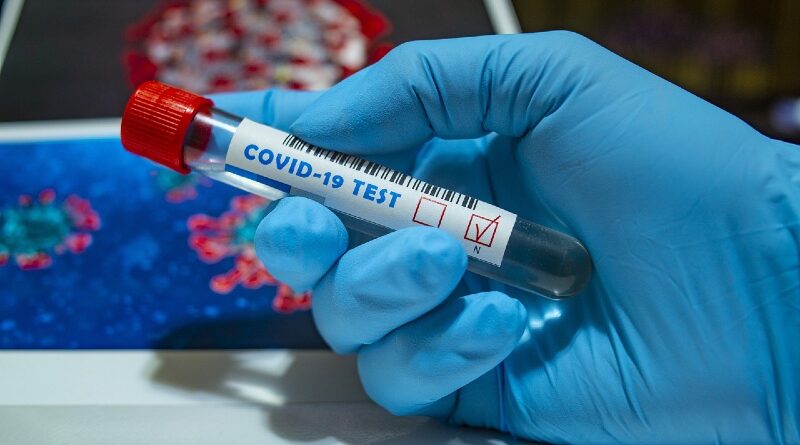Dallas County Reports 479 More COVID-19 Cases, Three More Deaths
As local officials continue to warn about the climbing COVID-19 cases and hospitalizations and early voting continues this week, here’s what you need to know today:
- Dallas County reports 479 more COVID-19 cases, three more deaths;
- Mask up at the polls;
- DFW COVID-19 prevalence study expands;
- SMU Professor: Don’t be fooled by election disinformation.
Dallas County Reports 479 More COVID-19 Cases, Three More Deaths
Dallas County Health and Human Services Wednesday reported 624 additional positive cases of COVID-19 and three more deaths for a cumulative total of 94,837 confirmed cases and 1,104 confirmed deaths.
There were also 145 additional probable cases reported Wednesday for a total of 5,558 probable cases and 14 probable deaths.
Of the 479 new confirmed cases reported Wednesday, 346 came through the Texas Department of State Health Services’ (DSHS) electronic laboratory reporting (ELR) system, and all are from October.
The additional three deaths reported Wednesday include two Dallas women in their 60s, and an Irving man in his 80s who didn’t have underlying health conditions. Unless otherwise noted, they had underlying health conditions.
Of the total confirmed deaths reported to date, about 24% have been associated with long-term care facilities.
“As our numbers continue to climb, I’ll remind you that we know what we need to do, we just need to do it: wear your mask and avoid crowds. Please make sure to have a safe Halloween and forgo trick-or-treating and Halloween parties this year for family activities,” Dallas County Judge Clay Jenkins said. “The number of school-aged children with COVID-19 has doubled over the last three weeks from 251 cases to 493 new cases (see Table 12) and this is a reminder of the importance of keeping our community safe by keeping our children safe and avoiding crowds and promoting masking.
“The most recent medical models indicate that we’ll have above 1,000 new cases per day by Thanksgiving unless we change our behavior, push through the COVID fatigue, and go back to doing the things that we know will keep us safe. We don’t want to get into the holiday season when it gets colder, more people are inside, and there are more gatherings with people outside our home, during an extremely high COVID spike or we will be in for a bad holiday season and spring. Let’s all band together now and move from selfishness to sacrifice to put our families, our community and our economy in a safer, better place.”
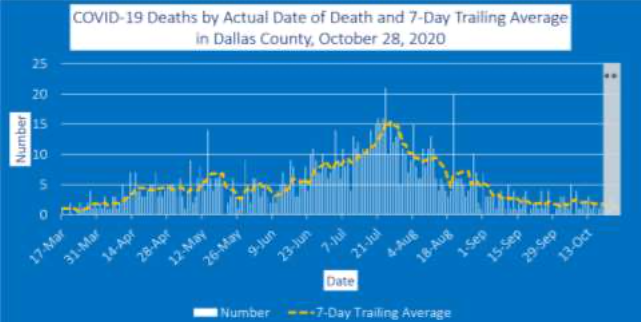
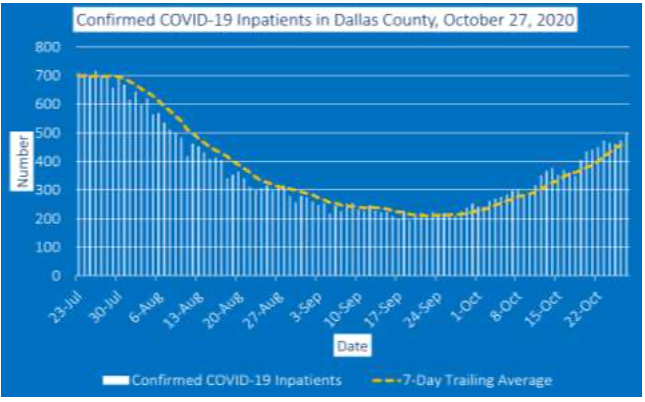
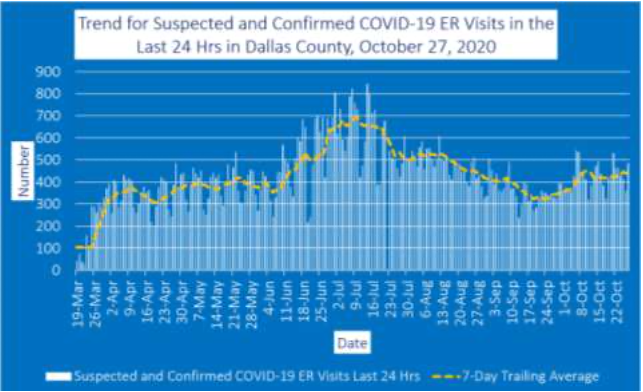
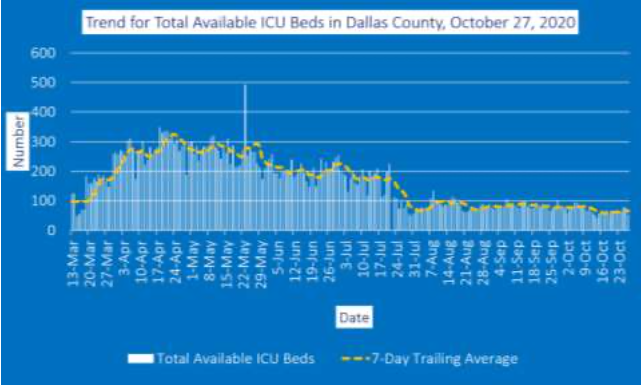
Dallas County reported 498 COVID-19 patients in acute care Tuesday. Additionally, there were 485 emergency room visits for COVID-19 like symptoms Tuesday, which represents around 20% of all emergency department visits in the county according to information reported to the North Central Texas Trauma Regional Advisory Council.
Of all confirmed cases requiring hospitalization to date, more than two-thirds have been under 65 years of age.
“We know historically from the increase over the summer, that hospitalizations can rise rapidly and take months to decline,” the county reported. “Local hospitals also have patients that have been hospitalized for extensive periods due to complications from COVID. These patients are not reflected in current numbers but illustrate the expansive impact of this pandemic on our hospital systems and health care workers.”
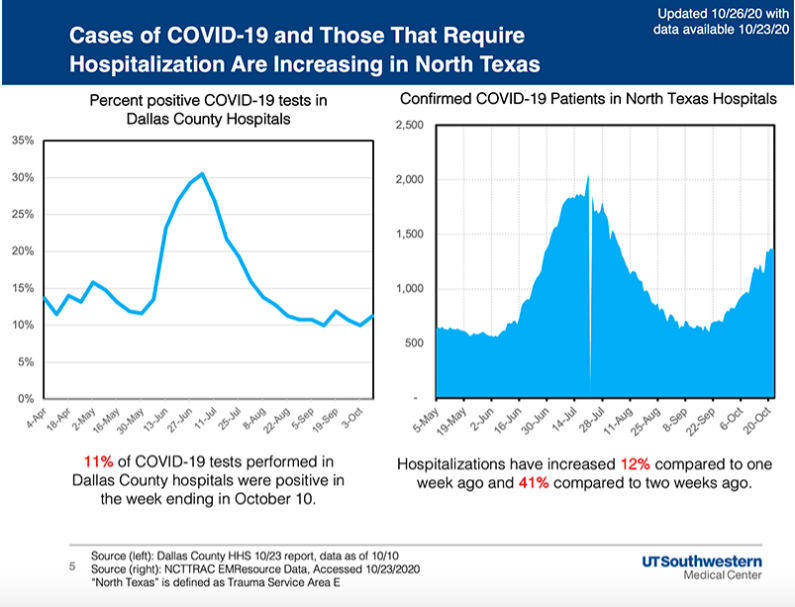
UT Southwestern Medical Center also notes hospitalizations in North Texas have risen again and the average volume for the past week was 103% higher than the most recent low in late September and 112% higher than the average volume in May.
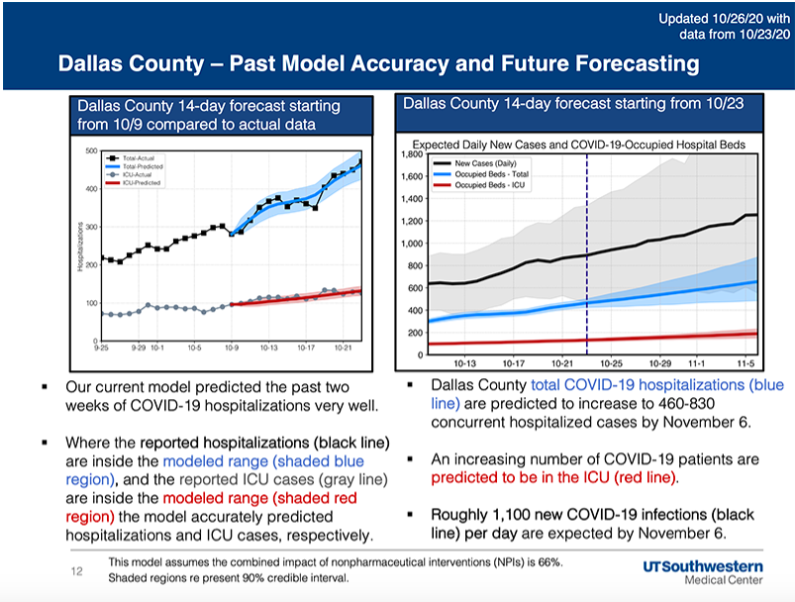
UTSW’s model also projects total COVID-19 hospitalizations in Dallas County could increase to between 460 and 830 concurrent hospitalized cases by Nov. 6, and roughly 1,100 COVID-19 cases per day are expected by Nov. 6.
The percentage of respiratory specimens testing positive for the virus that causes COVID-19 also increased to 14.2% of symptomatic patients presenting to area hospitals testing positive in the week ending Oct. 17.
A provisional total of 493 confirmed and probable COVID-19 cases were diagnosed in school-aged children between 5 and 17 years old during the week ending Oct. 17 – about twice the numbers of children diagnosed in this age group three weeks earlier.
Mask Up At The Polls
A federal judge in San Antonio has ordered anyone at a polling location in Texas to wear a face mask, media outlets reported.

U.S. District Judge Jason Pulliam Tuesday struck down a section of Gov. Greg Abbott’s July 2 executive order that exempted people from wearing masks at polling places, saying it violated the Voting Rights Act “because it creates a discriminatory burden on Black and Latino voters,” the Dallas Morning News reported.
“These minority groups experience greater risk of contraction and severity of the disease and this discriminatory effect can be eliminated, or at least mitigated, if all people wear masks at polling sites,” Pulliam’s order reads.
The lawsuit that led to the decision was filed by Mi Familia Vota, the Texas NAACP, and two voters, the papers reported.
Jenkins tweeted that 634,520 had voted in person as of Wednesday.
He added that nearly 700,000 Dallas County voters have cast their ballot as of Wednesday, which is half of all registered voters.
Dallas County reported 667,611 cumulative in-person and mail voters to the Texas Secretary of State’s office as of Tuesday, with 43.12% in person.
DFW COVID-19 Prevalence Study Expands
As more DFW businesses and schools have reopened, and as cases have begun to surge again, researchers are expanding participation for the DFW COVID-19 Prevalence Study, which is designed to reveal how widely COVID-19 has spread and why some communities are harder hit.
The study by researchers at UT Southwestern Medical Center and Texas Health is opening the process to allow anyone who lives in Dallas or Tarrant county to register online to participate, it was announced this week. Those who sign up may answer surveys online or via phone and may be further selected for additional tests to determine whether they have or ever had COVID-19. To volunteer, visit this website, or call
“We’ve made important strides in modeling and predicting COVID surges, which are mostly based on acute infections. We still need to understand how many people may have had mild or no symptoms and were never tested, but still had the infection. We also need to understand why the disease spreads more in some communities than others,” said Dr. Andrew Masica, chief medical officer of Reliable Health for Texas Health and study co-principal investigator. “Participation in this study is one way that individuals can help influence the DFW-area response to COVID.”
SMU Professor: Don’t Be Fooled By Election Disinformation

Between now and election day, experts say voters can expect to see a rise in the frequency and power of online misinformation and disinformation, but SMU social media expert Jared Schroeder says you don’t have to fall for it.
“If you think you’ve seen the full impact of false information on public discourse this year, conspiracy theorists and misinformation mongers around the world would like for you to hold their beer,” Schroeder said. “Social media feeds will be packed with all manner of false information. A variety of actors, foreign and domestic, will play on our fears and biases. They will seek to mislead voters and undermine our faith in the election outcomes.”
Schroeder suggests five ways to avoid being duped by misleading or false online information:
- Take the time to double-check claims.
- When in doubt, go to sources that employ journalists to do the actual reporting, rather than sources that simply comment on the work of others or don’t cite any sources at all.
- Be on the lookout for manipulated content. Audio and video clips can manipulate the words and actions of others to make it appear as if they said or did things they never said or did. Use fact-checking sites when images, videos, or sound clips seem “off.”
- Tricking the algorithms for paid content on social media can slip misinformation and disinformation into social media feeds. Seek out and read a variety of perspectives about issues.
- Never share anything you have not read and vetted yourself.

